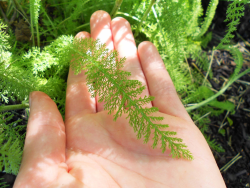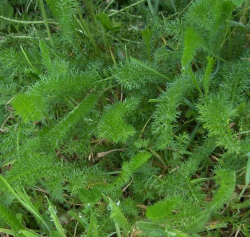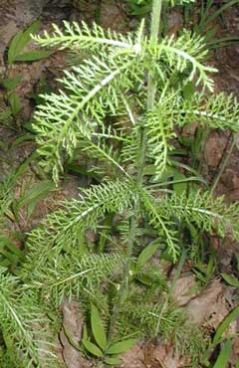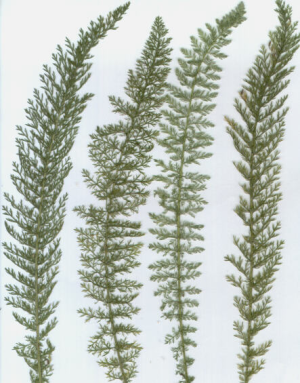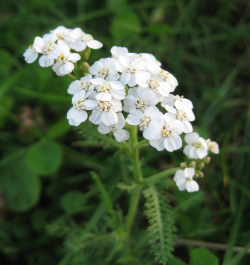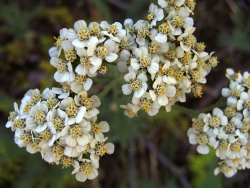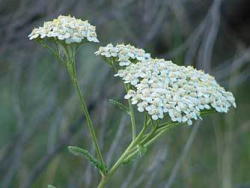Yarrow
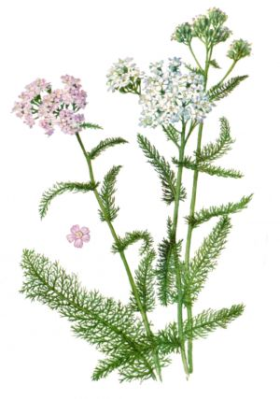 Common Name
Common Name
Yarrow
Other Common Names
Achillea
Botanical Name
Achillea millefolium
Family
Compositae (Asteraceae)
Character
Cool, dry; sweet, astringent, slightly bitter taste.
Description
The name “yarrow” comes from the Greek hiera, meaning ‘holy herb’. The plant is named after the hero of Greek legends, Achilles, who used it to heal the wounds of his soldiers.
Yarrow is a short to medium (0.2 – 1 metre or 0.66 – 3.3 feet), hairy, perennial plant with creeping rhizome and erect, furrowed, woolly stems; and has a spreading rhizomatous growth form.
Leaves
Leaves are 5 – 20 cm long, pinnate, dark green, and finely divided, the segments being partly divided pinnately, hence a feathery appearance. Leaves are evenly distributed along the stem, with the leaves near the middle and bottom of the stem being the largest.
Flowers
Each flower consists of about 20 tubular disc flowers and about 5 ray flowers with short, off-white or pinkish rays.
Medicinal Uses
The main medicinal actions of yarrow are:
Aerial parts
- Astringent – causes constriction of mucous membranes and exposed tissues.
- Diaphoretic – promotes sweating and thereby controls a fever
- Styptic – stops bleeding (local application)
- Vulnerary – aids the healing of wounds (local application)
Potential Indications
- Menorrhagia
- Bleeding wounds
- Hemorrhoids
- Fevers and conditions in which fever is present (eg. common cold)
- Diarrhea
- Topical treatment for slow-healing wounds
Essential oil
- Anti-inflammatory
- Anti-allergenic
- Antispasmodic
Applications
Flowers
Infusion - Drink for upper respiratory catarrh or use externally as a wash for eczema.
Inhalation - For hay fever and mild asthma, use fresh in boiling water.
Leaves
Fresh - To stop a nosebleed, insert a leaf into the nostril.
Poultice - Bind washed, fresh leaves) to cuts and grazes.
Aerial parts
Infusion - Use to reduce fevers and 'as a digestive tonic.
Tincture - Use for urinary disorders or menstrual problems. Prescribed for cardiovascular complaints.
Compress - Soak a pad in the infusion or dilute tincture to soothe varicose veins.
Essential Oil
Massage oil - For inflamed joints, dilute 5-10 drops yarrow oil in 25 ml infused St. John's wort oil.
Chest rub - For chesty colds and influenza, combine with eucalyptus, peppermint, hyssop or thyme oils, diluting a total of 20 drops oil in 25 ml almond or sunflower oil.
Contradictions
Known allergy. People with known allergy or sensitivity to yarrow should avoid using this plant.
Warnings
Yarrow may cause inflammation if the wound is subsequently exposed to sunlight.
Interactions
There are no known intersections of yarrow with other plant chemicals.
Side Effects
No side effects are expected if taken within the recommended dose range.
References
- Bishop, O. & Bishop, A. (1994). New Zealand Wild Flowers Handbook Over 200 common varieties. Hong Kong: Hodder Headline PLC
- Bone, K. (2003). A Clinical Guide to Blending Liquid Herbs: Herbal Formulations for the Individual Patient. St. Louis, MO: Elsevier
- Kowalchik, C. & Hylton, W. (1987). Rodale's Illustrated Encyclopedia of Herbs, USA: Schwartz Books
- Ody, P. (2000). The complete guide Medicinal Herbal. London: Dorling Kindersley
Posted in Yarrow
Ask a Question Or Join a Discussion

